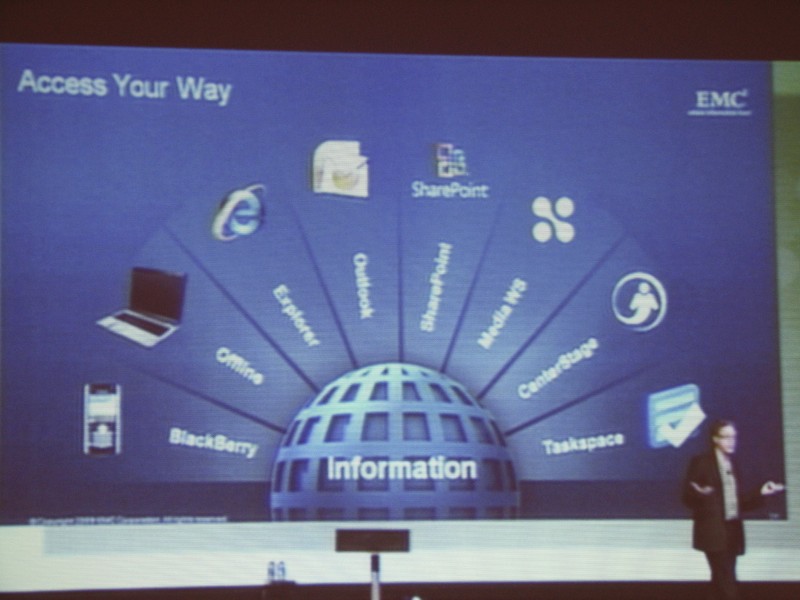EMC World: Companies that adopt new tools still need to manage the data

How or why is your information important? Information in a business setting might include e-mails that need to be retained and archived for regulatory purposes. Or it might be the collaborative documents that employees have been working on for a product launch.
At EMC World in Orlando this week, there's a lot of talk about virtual data centers and cloud infrastructure. But in a keynote speech this morning, Mark Lewis, president of the content management and archiving division, shifted his discussion to another critical matter: information management.
There's no doubt that there's a lot of information floating around out there these days - everything from e-mails to digital images. But, as Lewis notes, the bulk of that data - he says 95 percent of it - is unstructured. It's in a file somewhere - not in an application, not in a database. It's just roaming free.
That can't be good for a business, he said. In the aftermath of an economic collapse and scandals such as the Bernie Madoff Ponzi scheme, the chances that government will loosen the reins on compliance or regulatory policies around information is highly unlikely. EMC says it wants customers to put their information at the center of the business and consider these key focus areas:
Information Governance: There are policies in place about retaining information but the problem is that data tends to reside within the applications, such as an e-mail program. Instead, customers should use a centric approach where information is managed centrally and managed from one place, where polices can applied to everything, regardless of where it's housed. Last month, EMC released SourceOne, a rebuilt approach to archiving, e-discovery and compliance that's application independent. Lewis said EMC's own deployment will save the company $14 million over three years and that SourceOne will pay for itself within 13 months.
Information-centric Apps: Lewis says companies should be moving toward the creation of composite applications that rise from the platform, instead of something that's created in-house with start-from-scratch code. He compared it to music. Composers use existing notes to create their works of art - they're not trying to create new notes or discover new tones. The same idea should be applied to applications. EMC"s solution is the new Documentum xCelerated Composition Platform, which will allow customers to build case-centric apps that incorporate automation into them. Lewis says this is a money saver by reducing things like integration time and operating costs.
Information Connectivity: EMC goes back to the idea of information being stored into a repository of sorts, a common place where all data can be stored centrally but pulled into specific apps as needed. Best example: the trip to the doctor's office. When you show up for an appointment, patients go through the same round of questions - medication allergies, family history, even a current phone number. And then, when you head to the pharmacy, here come the same questions about drug allergies and so on. And don't count on anyone in the x-ray lab having any knowledge of your medical history either. In EMC's view, all of the information should be stored in a central repository - and when a nurse in the emergency room updates your medical history, the pharmacist should be able to see it when you pick up your prescription, as well.
Information Access: In today's workplace, information is everywhere - literally. It's on a laptop that's connecting to a WiFi hotspot at Starbucks. Perhaps it's on an iPhone, pulled in by a salesforce app, for example. At the same time, employees are using a number of communications tools - e-mail, blogs and even Twitter. And even the use of those tools vary - some people use Outlook to read their e-mails, others prefer Mozilla's Thunderbird and some might even want to pull their work e-mail into a Gmail or Yahoo mail interface. The bottom line is that employees are no longer tied to one location, one device or even one application. Of course, the boss could pull in the reins and lock the company's information behind a brick wall - but that doesn't make for very productive employees. Companies can take back control of their critical data, allowing a whole range of people - from senior executives to interns to third-party vendors - to access only the data they need. Companies that don't manage access to information within their environments run the risk of employees using unsecured, third-party apps instead. And that potentially leaves the information - and company - exposed to harm.
Information and Infrastructure: A cloud strategy sounds intriguing, but Lewis highlights the various layers of the cloud that need to be considered. There's cloud infrastructure, which is the layer above the hardware where capabilities are built - VMWare's vSphere or Amazon Web services, for example. On top of that is the services layer, which goes beyond raw capacity for data but also includes the rules for replication, tiering and policies. This layer includes EMC's Atmos and Amazon's S3. The third layer is the environments - the place where developers live, using tools such as Windows Azure or Salesforce's force.com. Finally, there's the apps layer, the place where users tap into the data by using cloud products such as Office Online or Google Apps.
Also see: Gallery: EMC World 2009
The larger message from Lewis' speech: Technology can help companies save real money and operate more efficiently. But as companies get caught up in new approaches such as virtualization and cloud computing, they should be keeping the data itself at the core of everything they do. How is being stored? How is it being accessed? How is it being protected?
Companies don't necessarily need to be scared by the idea of doing things differently. They just need to be smart about it. Lewis offered a deep-dive look into information management that's really worth considering.
Previous EMC World coverage: